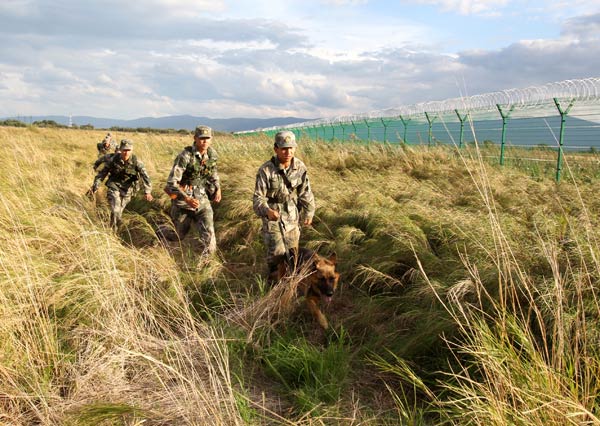Troop protect border, fisheries
Updated: 2012-09-28 00:19
By Jin Haixing (China Daily)
|
||||||||
As the autumn fishing ban period approaches in boundary rivers in Heilongjiang province, frontier soldiers were preparing to patrol and protect the environment, according to officers in the area.
 |
|
Border soldiers patrol Heixiazi Island in Heilongjiang province in September. JIANG DONG / CHINA DAILY |
A fishing ban is in place twice a year, during which all fishing activities are forbidden at all water ranges along the Heilong River and Wusuli River on China's border with Russia.
The summer ban was in July, and the autumn fishing ban will be from Monday to Oct 20 this year.
Frontier soldiers of the Heilongjiang military district of the People's Liberation Army stationed in Northeast China's Heilongjiang province are busy this time every year because of the patrols, said Liu Yichen, head of the frontier post in Mohe county, on Sept 19.
The soldiers' duty is preventing fishing activities during the period, keeping people from both countries from illegally crossing the border, and monitoring suspect vehicles and airplanes, Liu said.
Liu's post is in the northernmost settlement in China, known as China's Arctic Village. Usually, soldiers in the post patrol 70 km along the Heilong River, Liu said.
Jiang Nan, the political instructor for the company in the area, said that broder patrols in the area will increase during the fishing ban.
Crosshead if needed
In order to develop the efficiency of patrol operations, more advanced equipment is being supplied to the frontier soldiers.
In Heihe city, which is also near the Heilong River, the frontier forces stationed in the area developed a motor sled that can be used on open land or on snow, according to company commander Zhao Weijun.
The soldiers' video monitoring system can watch the border for 24 hours, making the patrol more efficient, said Wang Jiteng, 34, who is in charge of maintaining the video system.
When suspicious people are seen in the video, a report will be sent to a reaction team instantly, Wang Jiteng said.
In 2005, the video monitoring system was black-and-white, but the system in our company is one of the best in the Heilongjiang military district, with more advanced functions,said Wang.
Because the winters are very cold, a computer-controlled heater was installed in the Mohe base. And the station vehicle is equipped with a heater and kitchenware.
Meanwhile, soldiers in the frontier area have access to the Internet for their learning and education.
The National Digital Library of China settled in the Arctic military camp in Mohe in January 2011, said Jiang Nan, the political instructor.
A digital newspaper was also launched for the frontier soldiers, who like to read news from their hometowns, Jiang said.
Crosshead if needed
Another challenge for the soldiers' patrol is the numbers of tourists. It was estimated that more than 1 million tourists visit Mohe annually, with August and September as the peak season. Patrols then are difficult because those people can easily cross the border, according to Liu Yichen, the head of the frontier post.
Liu Yichun said that the frontier soldiers will educate the tourists about border regulations, which also provides a good opportunity to improve the soldiers' image.
Flocks of tourists have resulted in more garbage in the area along the Heilong River. Soldiers will help dispose of the trash and also work to prevent littering.
In Heixiazi Island in Fuyuan county, the problem is more obvious to frontier soldiers.
The 335-square-kilometer island, located in the confluence of the Heilong River and Wusuli River, was the last disputed part of the Sino-Russian border.
China and Russia unveiled boundary markers on Heixiazi Island in 2008. Under a bilateral agreement, half of the 335-square-kilometer island close to Fuyuan county belongs to China. The other half belongs to Russia.
Under a joint agreement between the two sides to cooperatively develop the island into an eco-tourism zone, it was opened to tourists in 2011. Many tourists have visited the island since.
As many tourists do not know border regulations, soldiers need to inform them during the soldiers' island patrols, said Wang Lubin, 26, the squad leader of soldiers stationed in the island
Heixiazi Island possesses a unique habitat and diverse wetlands. Currently, it maintains the most original marshland in China. In order to protect the environment, soldiers in the island have made a lot of banners and posters in key areas to provide information visitors and tourists.
In order to maintain the island's ecosystem, the frontier forces wrote clear regulations on construction and garbage disposal.
Ren Chongfu, a frontier soldier in the island, said that soldiers will help dispose of garbage and will educate tourists, too.
Contact the writer at jinhaixing@chinadaily.com.cn

 Relief reaches isolated village
Relief reaches isolated village
 Rainfall poses new threats to quake-hit region
Rainfall poses new threats to quake-hit region
 Funerals begin for Boston bombing victims
Funerals begin for Boston bombing victims
 Quake takeaway from China's Air Force
Quake takeaway from China's Air Force
 Obama celebrates young inventors at science fair
Obama celebrates young inventors at science fair
 Earth Day marked around the world
Earth Day marked around the world
 Volunteer team helping students find sense of normalcy
Volunteer team helping students find sense of normalcy
 Ethnic groups quick to join rescue efforts
Ethnic groups quick to join rescue efforts
Most Viewed
Editor's Picks

|

|

|

|

|

|
Today's Top News
Health new priority for quake zone
Xi meets US top military officer
Japan's boats driven out of Diaoyu
China mulls online shopping legislation
Bird flu death toll rises to 22
Putin appoints new ambassador to China
Japanese ships blocked from Diaoyu Islands
Inspired by Guan, more Chinese pick up golf
US Weekly

|

|







